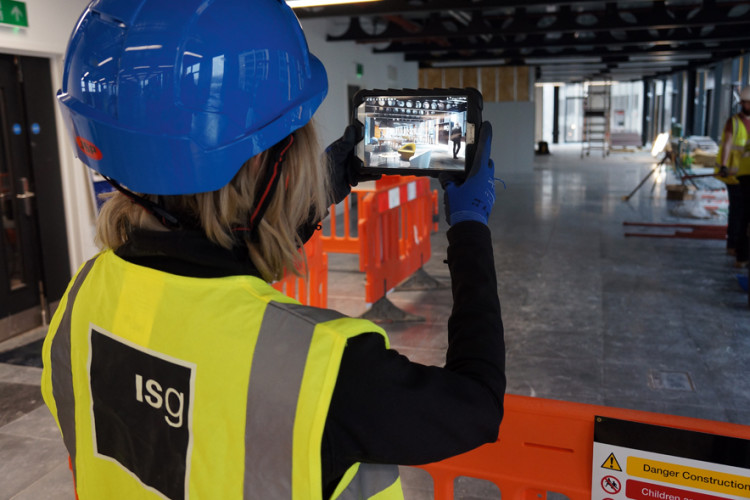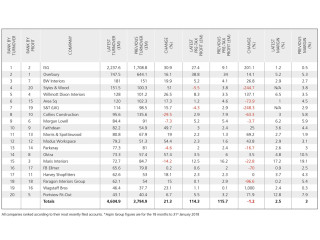While growth in the commercial building sector has lagged behind more vigorous sectors like house-building and infrastructure, this past year has seen activity perk up a bit.
This is good news for specialists in the interiors and fit-out sector, who will reap the reward of any upswing in commercial building further down the line.
Compared to last year’s strong performance, however, the fit-out sector is showing signs of fatigue. Average turnover is still increasing steadily (revenues grew by 21.3% in 2017/18, at the same rate as the previous period) but total pre-tax profits slipped 1.2% from £115.7m to £114.3m.
This is no disaster, of course. But it doesn’t compare particularly well with the results reported this time last year, when we saw total pre-tax profits in this sector grow by a vigorous 42.1%.
As previously, the dominant player in the market is ISG, a multidisciplinary group that is also active in construction, engineering services and property. ISG’s latest results mark a milestone for the group, which reported turnover of more than £2bn for the first time in its history.
Fit-out has always been a core discipline for ISG and it is currently the group’s largest single division. In the 12 months to December 2018, the fit-out division contributed revenues of £609.1m (2017: £395.9m), overtaking the UK construction division, which turned over £520m in 2018 (2017: £480.1m).
The company ended the financial year with a forward order book worth £232m. Key projects delivered in 2019 include schemes for Westminster City Council, a major investment bank and a top law firm.
“Despite uncertainty around Brexit, the London fit-out market remains strong and we head into 2019 with a strong forward order book,” said the company.
ISG’s fit-out division contributed £10.5m to the overall pre-tax profit figure of £27.4m.
Morgan Sindall subsidiary Overbury is once again the second-largest player in the fit-out market – its 2018 turnover figure of £747.5m might be dwarfed by ISG’s two billion, but it’s way ahead of third-placed BW Interiors’ £181m revenue for the same 12-month period.
Overbury is also once again the biggest profit-maker with a profit figure of £38.8m before tax. The company says that there have been no significant changes in the market sectors it serves, with the commercial office market being the largest, contributing 85% of revenue, and higher education accounting for another 8%.
It comes as no surprise that London remains Overbury’s largest geographical market – all the big fit-out contractors rely heavily on London. For Overbury, it accounts for 80% of its business.
Fourth-placed Styles & Wood was acquired in 2017 by venture capitalist Central Square Holdings – now renamed Extentia Group – and its reporting period changed to 30th June to match that of its parent company. The results shown here are therefore for the 18 months from 1st January 2017 to 30th June 2018.
This results in a turnover figure of £151.5m, 51% higher than the £100.3m for 2016; not a year-on-year increase, but still more than acceptable. Profit, however, is not so good: the company recorded a pre-tax loss of £5.5m over those 18 months.
.png)
The sale of the business to Extentia “crystallised the share options held by a number of colleagues,” explains the company. “The cost of the exercise was a cash cost of £1,087,000 and an increase in Share Based Payment charge to £1,145,000,” it adds.
Another consequence of the takeover was that Styles & Wood was obliged to adopt “a more prudent approach to estimates used in the recognition of revenue on contracts in progress”. This, combined with a general reduction in margins on tendered work, resulted in those pre-tax losses.
Styles & Wood is one of two loss-making firms in our table of top 20 fit-out specialist. The other is S&T (UK) which, despite describing itself as “a lean and agile organisation with strong technical and commercial abilities”, made a pre-tax loss of £4.3m in the 12 months to December 2017.
The company reports that its northern divisions underperformed and the group as a whole suffered from “supply chain disruption as a result of the insolvency of a major international contractor which resulted in the overrun of the Group’s costs on some of its major projects”.
The directors, in their review of 2017, say that the company “plans to consolidate during the next two years before it aligns itself for growth in the fields of construction and refurbishment in the long term”.
They continue: “The Group is now focusing on medium size projects (£15m - £25m), which was proven to be its sweet spot, in order to mitigate the risks associated with major variations, timely delivery and efficient usage of its supply chain”.
In March of this year, the sector was shaken when five fit-out contractors were fined a total of £7m after admitting a cover-pricing racket – in other words, colluding on the prices they would bid for contracts. The news emerged after property firm Jones Lang Lasalle (JLL) blew the whistle after acquiring a sixth member of the cartel, Bluu Solutions, which was let off a fine under the Competition & Markets Authority’s leniency programme.
The five companies were Fourfront, Loop, Coriolis, ThirdWay and Oakley. The biggest fine – just over £4m – was levied on Fourfront, whose subsidiary Area Sq takes sixth place on our table of the top 20 fit-out contractors this year.
Area Sq was merged with sister company Cube Interior Solutions in July 2017 to create a new business unit called simply ‘Area’. “The merger was agreed to ensure that Fourfront Group can deliver a single, focused offering to the market, allowing professional teams to engage with one business, irrespective of procurement criteria, for the first time,” said the company.
“All new projects formerly delivered by Cube Interior Solutions are now being undertaken by Area Sq Ltd,” it added. In the year to April 2018, Area’s turnover grew 17% to £120m although pre-tax profit fell 74% from £4.6m to £1.2m.
In May this year, it was reported that Trevor Hall, a former director of Cube Interior Solutions had been disqualified from acting as a company director for two and a half years and Oliver Hammond, a former director of Area Sq had been disqualified for two years.
This article was first published in the July/August 2019 issue of The Construction Index magazine
UK readers can have their own copy of the magazine, in real paper, posted through their letterbox each month by taking out an annual subscription for just £50 a year. Click for details.
Got a story? Email news@theconstructionindex.co.uk




